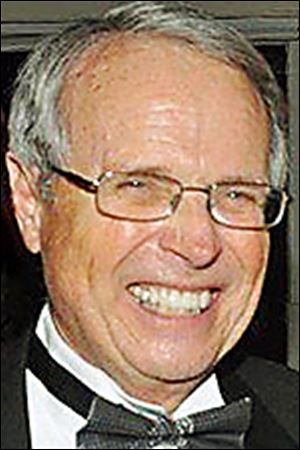
James A. King, 1940-2013
UT medical sociologist sought as a consultant
5/10/2013
King
James A. King, a retired University of Toledo sociology professor whose studies of such diverse topics as drug use in teens, homelessness, and stress among Toledo police officers often made news, died Wednesday in his West Toledo home. He was 73.
He had metastatic melanoma, his wife, Joan, said.
As a medical sociologist, one of his areas of expertise, he'd studied the qualities of health-care delivery systems that best serve employees. Through several firms he was a partner in, he was a health-benefits consultant, a role he played for the Wood County commissioners since the mid-1980s. He retired as a UT professor in 1999 and continued to work.
“He was never a broker. He was a pure consultant,” his wife said. “He was helping figure out what was best for them.
“He could not retire and not do anything,” his wife said. “You know the theory and can teach it all you want. He liked to practice what he taught.”
One venture in the 1980s paired him with Dr. Lurley Archambeau, a psychiatrist, in forming Integrated Psych Care, a mental-health preferred provider organization. The company was bought out after several years, Dr. Archambeau said, but the men remained friends.
“Jim was a brilliant mind, so he looked at things consistently from an intellectual point of view,” Dr. Archambeau said. “Jim was also an extremely practical man. Jim had a tremendous desire to take ideas and put them into motion.
“He just didn’t want to sit there and think about it. If he thought something was good enough and useful enough, he wanted to make it happen in real life and bring it beyond the walls of the academic institution,” Dr Archambeau said. “His loyal and integrity were hallmarks of the friendship. It was always great fun to think with Jim. He was a great listener and a great arguer and was a great teacher.”
Mr. King’s other specialties included social psychology and the sociology of deviance. While at UT, his studies often attracted news coverage, as when in 1990 he found that an “inordinate number” of Toledo police officers had highly negative views of their superiors and felt the promotions system was political; or in 1985, when he found that more homeless people in Ohio had mental disorders than did the general U.S. population, or in 1974, when he found that consistent use of illicit drugs in Lucas County was limited to a small percentage of teenagers.
He was especially proud of a book he wrote based on his study from 1971 to 1978 of mental hospitals in Ohio, his wife said.
Still, the classroom was his strength, his wife said, and former students often stopped him to say hello. Those who showed up to his 8 a.m. class half asleep didn’t stay that way for long.
“Someone described him as teaching with such authority and asking questions and trying to pull things out of people and getting them to think,” his wife said. “He liked those early classes.”
He was born Feb. 16, 1940, in Muncy, Pa., to Marjorie and Robert King. He was a 1958 graduate of Hughesville, Pa., High School. He was an Air Force veteran and served at Thule, Greenland.
He grew up Methodist, but converted to Roman Catholicism and attended St. Paul Seminary in St. Paul. He transferred to St. Procopius College in Lisle, Ill, and received a bachelor’s degree in philosophy.
“He wanted children, a family, and thought being in the priesthood would be very lonely,” his wife said.
His graduate studies were in sociology at the University of Notre Dame, where he received his master’s degree and doctorate.
“He just liked people and, so, liking people and watching people and trying to figure people out, he thought sociology would be for him,” his wife said.
His adviser was John Kane, a sociology professor, who introduced Mr. King to his daughter, Joan. The couple married June 12, 1971.
Mr. King’s entire 29-year academic career was at UT.
He was a member of what was then called the Lucas County Mental Health and Mental Retardation Board. He also served on the boards of Hospice of Northwest Ohio and Notre Dame Academy.
He was a coach for his son Ian’s soccer team at Gesu School, and afterward was a founder of the Toledo Celtics Soccer Club. He was coach of the UT club soccer team, which won the 1996 NIRSA Open Division Soccer National Championship. He recently was appointed to the board of Mercy College of Northwest Ohio.
“He was very outgoing and had a skill for putting people at ease,” said John Hayward, Mercy president and a longtime friend. The men belonged to a dinner and discussion group, the Little Shrimp Club.
“He was very unpretentious, very open to other folks’ opinions and views and loved to engage in discussion about things on which people might disagree, but always did so in a friendly way,” Mr. Hayward said.
Surviving are his wife, Joan King; sons Ian and Eamon King; daughters Erin Hafner and Meghan Gregory; brother Robert King; sisters Nancy McCarty, Sandy Buck, Dot Bennett, Leah Way, and Betty Jo Soohy, and eight grandchildren.
Visitation will be from 2 to 8 p.m. today in Coyle Funeral Home, where a Scripture service will be at 7 p.m. The funeral will be at 11 a.m. Saturday in Gesu Church, where the family will receive friends after 10 a.m.
The family suggests tributes to melanoma research at the University of Michigan; Gesu Church, where he was a 41-year member, or Hospice of Northwest Ohio.
Contact Mark Zaborney at: mzaborney@theblade.com or 419-724-6182.